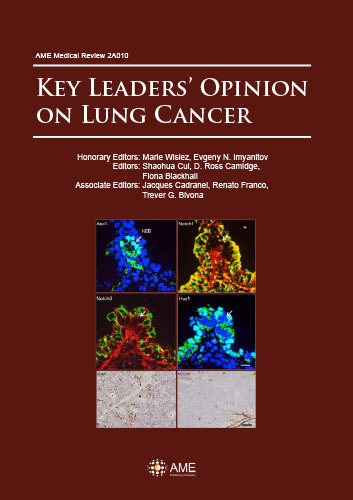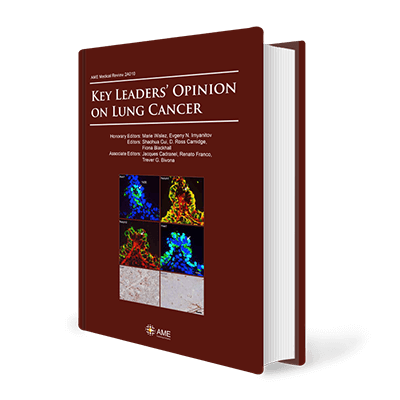
Key Leaders’ Opinion on Lung Cancer
| Editors: | Shaohua Cui, D. Ross Camidge, Fiona Blackhall |
Publisher: AME Publishing Company; 1st edition (2018)
ISBN: 978-9887784159
Hardcover: 243 pages
Language: English
The book is characterized by the diversity of topics covered and the desire to move from biology to imaging, targeted therapies to chemotherapy, or from cancer screening to palliative radiotherapy. The great challenges of today and tomorrow are put into perspective. In the first chapter, for example, the importance of basic science is posited as a prerequisite for improving the treatment of neuroendocrine cancers. New signaling pathways — NOTCH pathway, or new pathophysiological mechanisms – epithelial-mesenchymal transition or nutrient microenvironment availability, are explored. In the next two chapters, the importance of precision medicine tools such as, circulating tumor cells and tumor DNA, or the ability of a national health care system to make available to all patients the search for actionable mutations (Biomarqueurs France initiative), are put forward. The longest part of the book is devoted to targeted therapies for EGFR and ALK alterations, but also for BRAF V600 and MET exon 14 skipping mutations in adenocarcinoma, and finally for DLL3 protein target as a hope in the treatment of small cell carcinoma. Several articles are devoted in particular to the heterogeneity of ALK rearrangements and its theoretically therapeutic impact, to the difficulty of the management of brain metastases in ALK disease and to the therapeutic hope provided by some second and third generation ALK-inhibitors (ceritinib, brigatinib). The remaining articles focus on the targeting of the EGFR T790M resistance mutation by osimertinib and the double blocking of BRAF/MEK pathway in the treatment of BRAF mutated non-small cell carcinoma. The articles dealing with chemotherapy are exclusively dedicated to the treatment of small cell carcinoma, as if the chemotherapy had disappeared from the non-small cell carcinoma’s therapeutic armamentarium. Two articles question the place of radiotherapy in the treatment of patients with brain metastases, following the rather negative results of the Quartz trial, but which, in our opinion, included a patient population with a particularly poor prognosis.
Honorary Editors
| Marie Wislez | Service Pneumologie, AP-HP, Hôpital Tenon, Paris, France |
| Evgeny N. Imyanitov | N.N. Petrov Institute of Oncology, St.-Petersburg 197758, Russia; St.-Petersburg Pediatric Medical University, St.-Petersburg 194100, Russia; I.I. Mechnikov North- Western Medical University, St-Petersburg 191015, Russia; City Cancer Center, St.-Petersburg 197758, Russia; St.- Petersburg State University, St.-Petersburg 199034, Russia |
Editors
| Shaohua Cui | Department of Respiratory Medicine, Shanghai Chest Hospital, Shanghai Jiao Tong University, Shanghai, China |
| D. Ross Camidge | University of Colorado Cancer Center, Aurora, Colorado, USA |
| Fiona Blackhall | Institute of Cancer Sciences, Manchester University and The Christie NHS Foundation Trust, Manchester, UK |
Associate Editors
| Jacques Cadranel | Service de Pneumologie, Hôpital Tenon, Assistance publique-hôpitaux de Paris, GH HUEP, 4 rue de la Chine, Paris, France |
| Renato Franco | Pathology Unit, University of Campania, “Luigi Vanvitelli”, Via Luciano Armanni 5, 80136, Naples, Italy |
| Trever G. Bivona | Department of Medicine, Helen Diller Family Comprehensive Cancer Center, University of California at San Francisco, San Francisco, CA, USA |
Table of Contents
Foreword
Preface
Cancer Biology
1 Notch signaling and Tp53/RB1 pathway in pulmonary neuroendocrine tumorigenesis
8 Elucidating alternative pathways triggering small cell lung carcinoma tumor biology
11 A new angle on Notch combination therapies
16 DDR1 and Notch: a multifaceted synergy
19 In vivo cancer metabolism is defined by the nutrient microenvironment
23 A genomic analysis of large cell neuroendocrine carcinoma versus small cell lung cancer: which is which?
28 Treatment approach for large-cell neuroendocrine carcinoma of the lung using next-generation sequencing
30 Molecular resistance mechanisms of ALK inhibitors and implications for therapeutic management of ALK-rearranged lung cancer patients
37 The role of tumor-derived exosomes in epithelial mesenchymal transition (EMT)
Screening and Prevention
40 The French initiative paves the way: routine molecular profiling of advanced non-small-cell lung cancer fights inequalities in access to molecular targeted therapy and improves patient outcome
43 Taking action on actionable mutations: a French initiative on universality in precision cancer care
48 Screening for mutations in lung cancer in France: purpose of precision medicine
51 Biomarkers France: a first and distinctive step in assessing the impact of non-small cell lung cancer (NSCLC) patients routine molecular profiling
53 Determination of the optimal screen interval in low-dose CT lung cancer screening: are we there yet?
Diagnosis and Monitoring – Liquid Biopsy
56 Circulating tumor cells as a liquid biopsy in small cell lung cancer, a future editorial
60 Development of predictive liquid biomarkers for response to treatment in small cell lung cancer
65 Liquid biopsy in non-small cell lung cancer: come of age
68 The “liquid biopsy” in non-small cell lung cancer—not quite ready for prime time use
72 DNA hypermethylation of tumor suppressor genes as an early lung cancer biomarker
80 DNA methylation biomarkers in lung cancer diagnosis: closer to practical use?
Treatment (I) – Targeted Therapy
85 Afatinib and gefitinib: a direct comparison
87 Intracorporeal hand-sewn esophagojejunostomy after total laparoscopic total gastrectomy: a retrospective case-series study
88 Adding to the targeted therapy toolbox: BRAF and MEK inhibition in the treatment of BRAF V600E metastatic non-small cell lung cancer
96 BRAF inhibitors in advanced BRAF-positive non-small cell lung cancer
101 Crizotinib for ALK rearrangement-positive non-small cell lung cancer patients with central nervous system metastasis
104 Intracranial efficacy of crizotinib versus chemotherapy in PROFILE 1014: shining a light on central nervous system endpoints in clinical trials
110 Intracranial activity of crizotinib: something to rely on?
113 Clinical data and role of ceritinib a second-generation ALK tyrosine kinase inhibitor for the treatment of ALK positive non-small cell lung cancer
117 MET-inhibitors meet MET mutations in lung cancer
124 Adding chemotherapy to TKI: can we improve first-line treatment for EGFR-mutated NSCLC patients?
128 Distinct benefit from crizotinib in lung cancer patients carrying distinct ALK translocations: is fluorescent hybridization in situ testing still sufficient to guide clinical decisions?
131 Osimertinib: a breakthrough for the treatment of epidermal growth factor receptor mutant lung adenocarcinoma
136 A crowded, but still varied, space: brigatinib in anaplastic lymphoma kinase-rearranged non-small cell lung cancer
141 Osimertinib in advanced EGFR T790M-positive non-small-cell lung cancer: the clinical impact of AURA3
146 Targeted therapy in small cell lung cancer: can DLL3 notch up a victory?
150 Concomitant ALK/KRAS and ALK/EGFR mutations in non small cell lung cancer: different profile of response to target therapies
154 Dividing and conquering the variation among variants in EML4-ALK lung cancer
156 Are all ALK rearrangements created equal?
162 A story of ALK variants and the efficacy of ALK inhibitors: moving toward precision oncology
Treatment (II) – Chemotherapy
166 Is there really a role for the comprehensive geriatric assessment in metastatic non-small cell lung cancer?
169 ESOGIA: a “first step” for comprehensive geriatric assessment-guided treatment in non-small cell lung cancer
172 Cisplatin, etoposide, and irinotecan for relapsed small-cell lung cancer
175 Combination chemotherapy for relapsed small-cell lung cancer—perspective on mechanisms of chemoresistance
182 Thriving where others have faltered—a critical appraisal of the role of patient factors versus treatment effect in JCOG0605 trial in relapsed small cell lung cancer
185 Relapsed small cell lung cancer: is more better?
188 Is combined chemotherapy with cisplatin, etoposide and irinotecan the new standard treatment for patients with sensitive relapsed small cell lung cancer?
Treatment (III) – Immunotherapy
191 TIME for biomarker-driven immunotherapy in non-small-cell lung cancer patients
195 Immune checkpoint inhibitors in non-small cell lung cancer: is simultaneous blockade better?
199 Immune checkpoint blockade (ICB) for first line treatment in non-small cell lung cancer (NSCLC)
202 Moving the mountain in advanced non-small-cell lung cancer: evolving immunotherapies for a dire disease
Treatment (IV) – Radiotherapy
209 Should optimal supportive care alone be the standard of care for brain metastases patients from non-small cell lung cancer, who are not eligible for radiosurgery or surgery?
212 How do the QUARTZ trial results inform future research for patients with brain metastases from non-small cell lung cancer?


